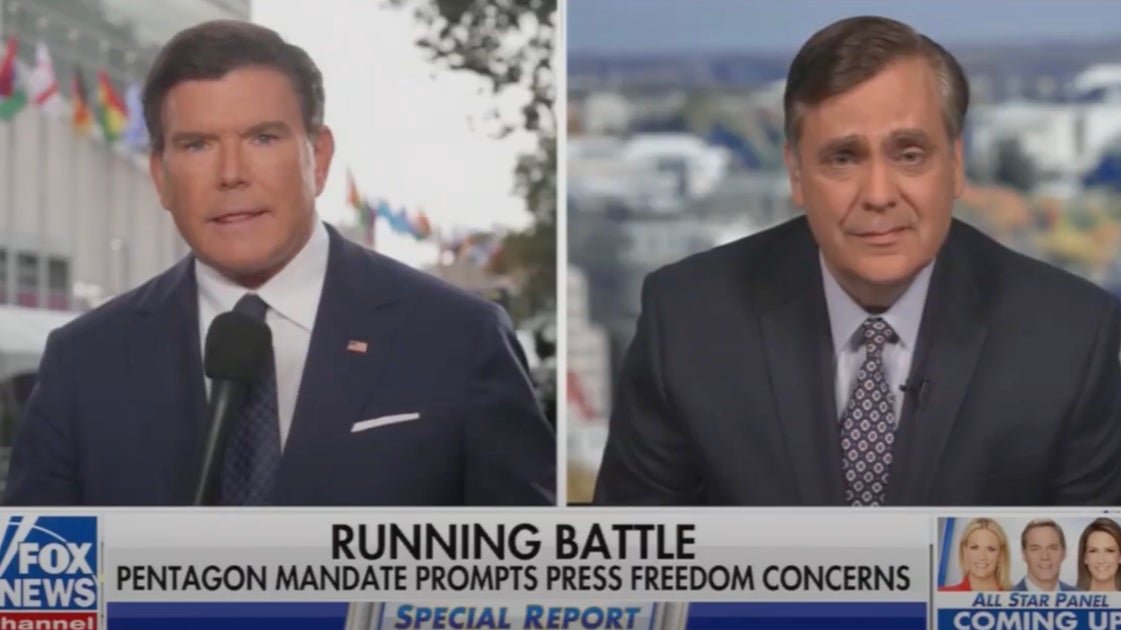Fox News aired criticism Monday of controversial new media restrictions at the Pentagon, which will require credentialed journalists to sign a pledge not to report information that hasn’t been authorized for release — even if the information is already unclassified.
The restrictions were detailed in a 17-page memo distributed Friday. Defense Secretary Pete Hegseth, a former Fox News personality, defended the policy on social media, stating that journalists will no longer be allowed to “roam the halls of a secure facility.”
Fox News contributor Jonathan Turley condemned the restrictions on air.
“Bret, this is actually quite breathtaking in terms of its implications for the free press,” the longtime law professor told “Special Report” host Bret Baier. “There is no precedent for what they’re doing here.”
Turley added that reporters aren’t allowed to roam around freely at, for example, the CIA, but that the Pentagon has had “a long tradition of allowing the media to work with its own representatives in getting the story right,” which sometimes has led to classified information being published.
“Some of those cases are the most significant in our country, like the Pentagon Papers, that produced great reforms, that informed the public of things that they had to know about,” Turley continued Monday. “This measure is simply a bridge too far. It really does raise core press protections and it would devastate the press corps in the Pentagon.”
Baier noted that during his own time as a Pentagon correspondent, he talked to “all kinds of officials” while traversing its corridors, and that there was always at least a conversation when restrictions on a story were being imposed over concerns of national security.
“And it was dealt with,” Baier continued Monday. “Officials, year after year after year, dealt with — back and forth — with the press. This is different. This is, ‘You have to sign this paper or you have to leave the Pentagon.’”
Hegseth already banned reporters in May from accessing certain areas of the Pentagon without prior approval or an official escort.
Advocates for press freedoms have denounced the required pledge as what essentially appears to be a nondisclosure agreement with the government, arguing that independent reporting will cease to exist if it has to be approved by the center of power being probed.
TruthSavesLives
Your SupportFuelsOur Mission
Your SupportFuelsOur Mission
Dangerous myths about medicine spread fastest when watchdogs are silenced. Become a member today and help us safeguard science, protect health, and keep the public informed.
We remain committed to providing you with the unflinching, fact-based journalism everyone deserves.
Thank you again for your support along the way. We’re truly grateful for readers like you! Your initial support helped get us here and bolstered our newsroom, which kept us strong during uncertain times. Now as we continue, we need your help more than ever. .
We remain committed to providing you with the unflinching, fact-based journalism everyone deserves.
Thank you again for your support along the way. We’re truly grateful for readers like you! Your initial support helped get us here and bolstered our newsroom, which kept us strong during uncertain times. Now as we continue, we need your help more than ever. .
Already contributed? Log in to hide these messages.
The new restrictions follow numerous leaks that have sprung from President Donald Trump’s administration: Hegseth accidentally shared details of an impending military strike on Yemen with a journalist in March, later sharing nearly-identical intel on a personal group chat that included his wife.
While Fox News has defended some of the most controversial Trump-related scandals during his time in office, the president himself appeared critical of the new restrictions when asked Sunday by a reporter if the Pentagon should be involved in what journalists can cover.
“No, I don’t think so,” Trump replied, adding: “Nothing stops reporters. You know that.”

